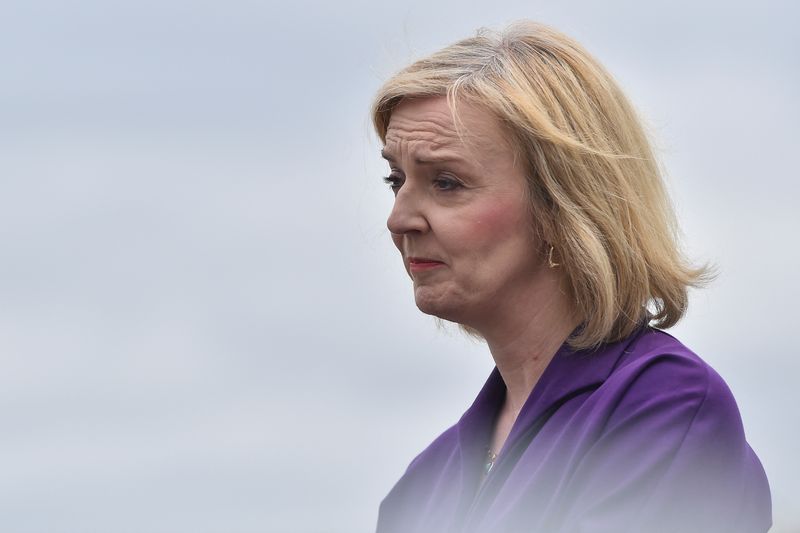By Elizabeth Piper and Huw Jones
LONDON (Reuters) -Liz Truss, the front-runner to become Britain's next prime minister, wants to examine the roles of the country's three financial regulators as part of a review, a source close to her leadership campaign said on Thursday.
Provided she wins the contest, Truss is expected to examine the role of the Financial Conduct Authority (FCA), the Bank of England's Prudential (LON:PRU) Regulation Authority (PRA), and the Payment Systems Regulator (PSR).
"No decisions have been made on the future of regulators," the source said, asking not to be named. "She's clear that there has not been enough focus on economic growth."
The FCA, the Bank of England and the PSR declined to comment. The Financial Times first reported the story.
Truss, foreign minister, and former finance minister Rishi Sunak are in a Conservative Party run-off to replace Boris Johnson as prime minister, with the result to be announced on Sept. 5.
She has pledged to cut taxes to mitigate the impact of surging prices on households.
Truss and her supporters have suggested the government should have a bigger role in how the Bank of England https://www.reuters.com/world/uk/boes-bailey-says-he-will-fulfill-his-term-whoever-next-uk-pm-is-2022-08-05 operates as inflation surges to above 10%, five times more than the BoE's target level.
BoE Governor Andrew Bailey has said independent regulators are part of London's standing as a global financial centre.
The FCA, under its chief executive Nikhil Rathi, is undergoing an internal revamp following its botched handling of London Capital & Finance, an investment firm that collapsed, leaving taxpayers with the compensation bill.
The PRA is under pressure from insurers to allow them to invest more in infrastructure as part of a post-Brexit reform of Solvency II capital rules inherited from the European Union.
A financial services and markets bill put before parliament last month gives the FCA and PRA a new secondary objective of aiding economic growth and the financial sector's competitivenes, but some firms say it does not go far enough.
The PSR, operational since 2015, is under pressure from lawmakers to resist moves by Visa (NYSE:V) and Mastercard (NYSE:MA) to raise fees on users of their payment networks.
SINGLE PEAK?
Britain previously had one main financial regulator, the Financial Services Authority, which was scrapped after undercapitalised banks had to be bailed out by taxpayers in the 2007-09 global financial crisis.
This 'twin peaks' approach saw the creation of the FCA to regulate conduct, and the PRA and the BoE to ensure banks and insurers hold enough capital.
Merging the regulators would be potentially be a long and difficult undertaking.
"What possible benefit this last would be to anyone is a mystery to me," Simon Gleeson, a partner at Clifford Chance law firm, said.

Rupert Harrison, portfolio manager BlackRock (NYSE:BLK), said the need to split conduct and prudential supervision had been an important lesson from the financial crisis and had been applied around the world.
"Plus if the lender of last resort isn't intimately familiar with balance sheets thanks to being the prudential supervisor, you get problems," Harrison said in a tweet.